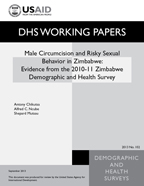- PUBLICATIONS
- JOURNAL ARTICLES
- ACCESS PUBLICATIONS
Publications Summary
- Document Type
- Working Papers
- Publication Topic(s)
- HIV/AIDS
- Country(s)
- Zimbabwe
- Language
- English
- Recommended Citation
- Chikutsa, Antony, Alfred C. Ncube, and Shepard Mutsau. 2013. Male Circumcision and Risky Sexual Behavior in Zimbabwe: Evidence from the 2010-11 Zimbabwe Demographic and Health Survey. DHS Working Papers No. 102. Calverton, Maryland, USA: ICF International.
- Download Citation
- RIS format / Text format / Endnote format
- Publication Date
- September 2013
- Publication ID
- WP102
Download
 Male Circumcision and Risky Sexual Behavior in Zimbabwe: Evidence from the 2010-11 Zimbabwe Demographic and Health Survey (PDF, 493K)
Male Circumcision and Risky Sexual Behavior in Zimbabwe: Evidence from the 2010-11 Zimbabwe Demographic and Health Survey (PDF, 493K)
